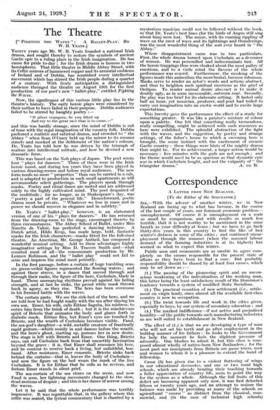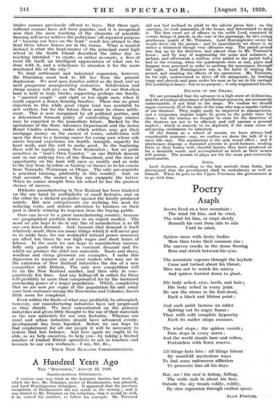Correspondence
• A LETTER FROM NEW ZEALAND. [To the Editor of the SPECTATOR.]
SIR,—With the advent of another winter, we in New Zealand are facing up to what has become, in the course of the last couple of years, our foremost economic problem— unemployment. Of course it is unemployment on a scale so small by comparison, and with results so much less terrible, that it is not worthy to be mentioned in the same breath as your difficulty at home ; but we have to go back thirty-five years in this country to find the like of last winter's distress in some of the cities ; and continued unem- ployment through the summer (when the seasonal labour demand of the farming industries is at its highest) has warned us what to expect this winter.
Public men and economists are as unable to agree com- pletely on the causes responsible for the present state of affairs as they have been to find a cure. But probably responsibility should be shared by at least four causes, which may be set down as :— (1.) The passing of the pioneering spirit and an uncon- scious weakening of the individualism of the working man, this latter being the least satisfactory result of the Dominion's tendency towards a system of modified State Socialism.
(2.) The practical cessation of new settlement (i.e., settle- ment on virgin land), since almost all the available first-class country is now in occupation.
(8.) The twist towards life and work in the cities given, especially to boys, by our system of secondary education ; and (4.) The marked indifference—if not active and prejudiced hostility—of the public towards such manufacturing industries as are well suited to establishment in New Zealand.
The effect of (1.) is that we are developing a type of man who will not set his teeth and go after employment in the bulldog manner of his fathers : he looks to the Government for help the moment he feels the slightest pressure of adversity. One blushes to admit it, but this class is com- posed almost wholly of native-born New Zealanders ; for the most part our immigrants from Britain are game triers, men and women to whom it is a pleasure to extend the hand of fellowship.
Cause (8) has given rise to a violent fluttering of wings in our educational dovecotes and one or two rural high schools, which are already bending their teaching towards a fuller appreciation of country life, seem to point the way for the system as a whole. Although the full fruits of this defect are becoming apparent only now, it was first detected fifteen or twenty years ago, and an attempt to restore the balance was made by providing at many of the schools an agricultural "course" as distinct from the classical, com- mercial, and (in the case of technical high schools)
trades courses previously offered to boys. But these agri- cultural courses have not been popular, and it is recognized
now that the mere teaching of the elements of scientific farming will never achieve the politicians' oft-repeated purpose of "keeping our boys on the land," much less attract to the land those whose homes are in the towns. What is wanted instead is what the head master of the principal rural high school in the South Island described the other day as teaching intended "to create, or rather re-create, a love of rural life itself, an intelligent appreciation of what can be done with it, and a reluctance to abandon it for the more straitened life of the city."
To land settlement and industrial expansion, however, the Dominion must look to lift her from the present depression. We need more families settled on the land, and we need prosperous manufacturing industries. Subdivision and cheap money will give us the first. Much of our first-class Land is held in large blocks, supporting perhaps one family, a "married couple" and eight or ten single men, when it could support a dozen farming families. There was no great objection to this while good virgin land was available to new settlers, but for the future there must be closer settle- ment. This is now recognized by all political parties, and a determined forward policy of subdividing large estates may be expected in the immediate future. Backed by the operations of the State Advances Department and the newer Rural Credits scheme, under which settlers may get their mortgage money on the easiest of terms, subdivision will open the door to a farming career for young men whose sole assets beyond experience are health, strength, capacity for hard work, and the will to make good. In the beginning these will be mainly young New Zealanders ; but we pride ourselves in "God's Own Country" on our British descent and on our undying love of the Homeland, and the door of opportunity on the land will open as readily and as wide to the boy from Ayrshire or Galway or Sussex as to his cousin from Taranaki, Wairarapa or Otago. The only pre-requisite is practical training, preferably in this country. And, on that account, the sooner a boy can emigrate the better. When he comes straight from his school he has the greatest chance of success.
Hitherto manufacturing in New Zealand has been hindered on the one hand by multiplicity of small factories, and on the other by a diehard prejudice against the locally produced article. But now entrepreneurs are realizing the need for reducing costs, and stricter attention to business on their part is slowly winning its response from the buying public.
Ours can never be a great manufacturing country, because our geographical position denies us an export market. The most we can hope to do in any line of manufacture is to fill our own home demand. And, because that demand is itself relatively small, there are many things which it will never pay us to make here, for our wonderful natural power resources are offset ten times by our high wages and short hours of labour. In the main we can hope to manufacture success- fully only goods which are in constant demand and for which we produce the chief raw materials. Boots and shoes, woollens and cheap glassware are examples. I make this digression to reassure any of your readers who may see in the extension of New Zealand industries the rise of a new competitor with Britain. The only new competition will be on the New Zealand market, and then only in com- paratively few lines. And any falling-off in orders for these will probably be more than compensated for by the increased purchasing power of a larger population. Which, considering that we are now per caput of the population far and away your best customer among the Dominions and Colonies, leaves little room for complaint.
Even within the limits of what may profitably be attempted, however, our manufacturing industries have not progressed as they should. We have concentrated on the primary industries and given little thought to the use of their materials as the raw materials for our own factories. Whereas our rural and urban industries should have advanced evenly, development has been lopsided. Before we can hope to find employment for all our people it will be necessary to restore that lost balance. And here again we ought to be able, as we help ourselves, to help you—by taking a limited number of trained British operatives to act as teachers and foremen to our own workmen.—I am, Sir, &c.,
YOUR NEW ZEALAND CORRESPONDENT.































 Previous page
Previous page